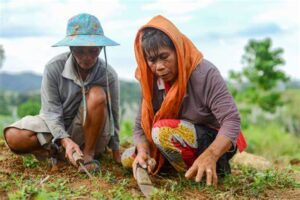
Nearly six years after the late Danding Cojuangco wrote to the Presidential Agrarian Reform Council (PARC) and confessed that his 12 haciendas in Negros Occidental covering 4,654 hectares and operating under the South Negros Joint Venture Corp. (SJNVC) incurred total losses of P2.9 billion from 2005 to 2016.
It was an admission against self-interest as those 12 haciendas were supposed to be distributed to thousands of agrarian reform beneficiaries (ARBs) who were transformed instead into farm workers following the formation of “cooperatives” and partnered with the SJNVC. Instead of becoming landowners themselves, the ARBs had to make do with low wages in the hope of getting a windfall with the promised share of annual profits.
But the haciendas were not the Negros version of paradise starting in 1998 and farmers soon came to grips with the bogus promises, prompting thousands of them to complain to the Department of Agrarian Reform (DAR) about their slave wages and non-remittance of their share of the profits. The DAR’s National Agribusiness Venture Arrangements Evaluation Committee (NAEC) recommended on July 1, 2017 the revocation of the joint venture scheme with Cojuangco. NAEC told PARC that each CARP beneficiary who owned 2.56 hectares in the haciendas only received a salary of P10,000 annually, or P833 monthly. PARC’s executive committee recommended to then President Rodrigo Duterte to scrap the joint venture, saying it did not improve the lives of the ARBs as envisioned by DAR AO 2 of 1999.
Owing to the financial hemorrhage, Cojuangco was forced to transfer the management of the haciendas to the Caña Dulce Agro Industrial, Inc. – represented by Miguel S. Hinojales, Lagrimas H. Llorca and Michael Andrew V. Hinojales— from 2016 to 2019. With the expiration of the joint venture this year, the Cojuangcos are rushing to distribute the haciendas to their employees and the relatives of their encargados. The farmers are fuming as they foresee an avalanche of complaints from the management against them in a bid to oust them from the list of ARBs. Worse, they are up against a legal mumbo-jumbo that equates their receipt of “profit-sharing” from the joint venture as payment for their land.
The Negros Oriental farmers are converging in Manila on Feb. 19, 2024 to demand that President Ferdinand Marcos Jr. scrap the joint venture and order the immediate distribution of the Cojuangco haciendas to the farmers. They will be joined by Batangas farmers who have been demanding the acquisition of the agricultural land of Hennessy Corp. as the company already received a memorandum of valuation (MOV) from the Land Bank of the Philippines (Landbank) three years ago but could not issue a certificate of deposit (COD) since it has no money for the acquisition. Under the rules, the COD is issued 30 days after the landowner receives the MOV.
In Nasugbu, Batangas, at least 50,000 CARP beneficiaries are set to lose land after the DAR Secretary Conrado Estrella III cancelled their certificates of land ownership awards (CLOAs) in a controversial ruling issued on Dec. 29, 2023. Estrella’s 63-page order jurisdictional basis to end litigation struggles that have spanned almost four decades. He ordered the provincial agrarian reform program officer to consolidate the six certificates of titles for Haciendas Caylaway, Palico and Banilad and directed the redistribution of 1,322 hectares and allowed Roxas and Co., Inc. to keep the other 1,322 hectares.
The farmers argued that their former counsel misled them and claimed they were not consulted on the plan to withdraw all cases and submit to the jurisdiction of the DAR secretary. The Roxas family had petitioned the DAR to be allowed to repossess Haciendas Palico, Banilad and Caylaway and Estrella granted their plea, to the detriment of thousands of farmers. (DIEGO MORA)